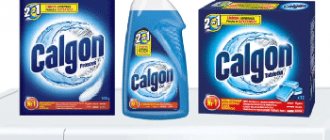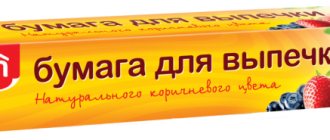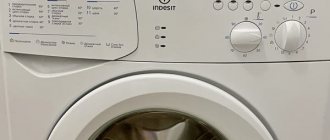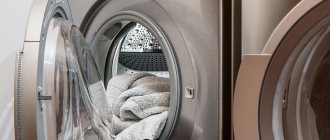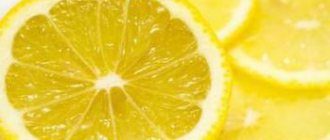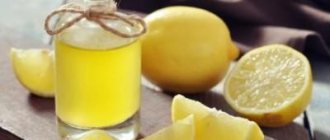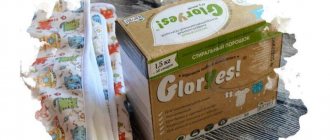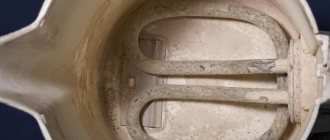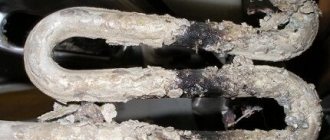"Kalgon" - composition and description. Hard water is a big problem when doing laundry. When heated, scale forms, which settles on the seals and heating elements.
The heating elements burn out, and the O-rings begin to leak water to the bearings, after which the latter fail. Water softeners, such as Calgon, will help you avoid breakdowns of household appliances. Its substitutes are also considered.
- Description of the product
- Calgon Composition
- pros
- Application
- Reviews from the Internet
- Industrial and popular analogues
- Tips and videos
Description of the product
The Calgon brand comes from the USA and is owned by the Reckitt Benckiser corporation, which also owns 16 trademarks, including Dettol, Durex, Finish, Vanish, Veet. The manufacturer is the same Reckitt Benckiser LLC, the plant in the Russian Federation is located in the Moscow region.
The range includes powder, tablets and liquid products that have the ability to neutralize hardness salts in water. The substances in the product prevent the accumulation of scale on the parts of the washing machine, save powder when washing, and make the process more efficient.
"Kalgon"
Do you need Calgon for washing?
The main function of Calgon for washing machines is to reduce water hardness. Washing in soft water reduces the formation of scale on the heating element and other parts of the machine. Limescale deposits on the heater can lead to its burnout, which will require repairs. If you have been using your washing machine for a long time using hard water, then it is worth descaling. You can read more about this here.
To decide whether to use Calgon or not, you need to find out what it does and what its advantages are. Calgon performs a number of important functions.
- Reduces washing powder consumption. In soft water, the consumption of cleaning agents and detergents is less.
- Softens water, which improves the quality of washing clothes.
- It prevents white items from turning gray when washed by normalizing the calcium content in the water.
- Prevents the formation of scale inside the washing machine.
- After washing, laundry becomes softer to the touch.
The benefits and benefits of using Calgon for washing machines and laundry are clear, but many are also interested in another question: is this product harmful to health? Most experts agree that the components included in the composition do not have a negative effect on human health. An exception may be people with hypersensitivity to substances contained in the product. This can manifest itself in allergic reactions causing redness and irritation of the skin.
Despite the general harmlessness of Calgon, it is better to use basic precautions. Wear rubber gloves before use and store Calgon in a dry, dark place out of the reach of children. If the product accidentally gets on the mucous membranes of the eyes, nose or mouth, immediately rinse them under running water and consult a doctor.
Calgon Composition
On each package of Calgon product the composition is indicated:
- sodium tripolyphosphate (50%);
- polycarboxylates (up to 30%);
- microcrystalline cellulose (up to 15%);
- polyethylene glycol (up to 5%).
The principle of operation is based on a chemical reaction between calcium ions, which cause water hardness, and sodium salts in the powder. Polycarboxylates and ethylene glycol help neutralize limescale and protect washing machine parts.
Cellulose replaces the phosphate component in the powder, making it harmless to humans and animals.
What does Calgon contain?
To find out what alternatives there are to using Calgon, you need to understand its chemical composition. In the instructions for use, the description of the main active ingredients of the drug is as follows:
- sodium polyphosphate (salt of polyphosphoric acid);
- polycarboxylates - a set of aggressive acids (about 30–35%);
- technical soda;
- polyethylene glycol;
- microcrystalline cellulose.
The last two components from the list have nothing to do with anti-scale formation. Polyethylene glycol acts as a flavoring agent, and cellulose, which has absorbent properties, gives the product structure.
The main active ingredients are the first three components - carboxylates , soda and sodium tripolyphosphate . They bind ions of calcium and magnesium salts, thereby preventing the deposition of limescale on important nodes and elements of the SMA.
Initially, the softener components were only soda and sodium polyphosphate. Over time, new components were added (fragrances, other flavorings), their proportions changed, but the main active ingredients remained the same.
Therefore, instead of Calgon, you can safely use cheaper, but no less effective substitutes with a similar chemical composition. These are the ones that will be discussed further.
pros
"Kalgon" helps to achieve not only the removal of scale, but also has a number of advantages over its analogues:
- if you add the powder together with the main detergent, the consumption will be more economical;
- in soft water, the removal of contaminants from fabric fibers is faster and therefore more effective;
- the service life of household appliances increases, there are no unexpected expenses for repairs;
- When washed, products do not lose color saturation, since there is no longer a gray deposit of scale.
The shape of the tablets allows you to use the product in doses (no need to measure anything). It is also easier to store compressed powder; there is no risk of inhaling particles, they will not remain in the air.
Are you unplugging your washing machine?
Oh yes! No
Is the product really that effective?
Studies have been repeatedly conducted where, as a result, Calgon was exposed as an ineffective remedy. Some experts say that in terms of its constituent components the substance is an ordinary washing powder. the latter, by the way, also softens the water. Others were unhappy that the product was only for prevention and did not help with already accumulated plaque.
There are a lot of both positive and negative reviews about Calgon. Therefore, opinions vary greatly. But, if you have scale in your washing machine, you can quickly remove it using folk remedies. For example, vinegar or baking soda.
Therefore, one can judge the usefulness/uselessness of Calgon only after using it. But, nevertheless, we will give several reviews from housewives who used this substance during washing.
Application
The dosage of the product depends on the degree of water hardness. If it is large, then each wash will require more:
- For high hardness, you need 90 ml of gel or 80 g of powder.
- For average – 60 ml of gel or 60 g of powder.
- For low temperatures – 30 ml of gel or 40 g of powder.
Expert opinion
Irina. Housewife.
Ask a Question
Dosing tablets is even easier - you need to add 1 tablet for each cycle under any operating conditions.
Dry products are added directly to the powder, and liquid forms are poured into the rinse compartment or added to the washing gel.
Packaging option
What can be replaced
If you don’t have such a product at hand, and when washing you want to protect your washing machine from scale formation, then you can use analogues that are similar in their effect. This can be not only store-bought products, but also handy home remedies.
Vinegar
You can try using vinegar 9 percent. This product should be poured into the compartment intended for the main wash.
It is important to choose a high temperature mode. But it is not recommended to reload the drum itself
Soda
Ordinary soda will help reduce the hardness of the water used at home, and thereby protect internal parts from possible deposits. There are two ways to use it:
- In the first case, you need to pour the soda along with the powder. This will make it possible to soften the water.
- In the second case, you need to pour a little soda into the compartment intended for washing powder, and then run the shortest wash, without loading things into the machine. The operating time of the device should be forty minutes, and the temperature should not be below sixty degrees.
Lemon acid
Citric acid is quite effective. Sixty grams of it is poured into the compartment intended for powder. In this case, you need to select a washing mode with a temperature of at least 70 degrees, but you do not need to load things into the machine. This method will dissolve accumulated scale.
Antiscale Nast
This is an effective remedy at an affordable cost. But the effectiveness is less than that of Calgon. It will be able to prevent the formation of scale, but will not improve the quality of washed laundry.
Alfagon
Alfagon is an excellent and cheaper substitute that has properties similar to Calgon. It also softens hard water, but this product will not be able to rid machine parts of existing scale.
Reviews from the Internet
“I often have to deal with branded clothing and delicate fabrics. For 5 years I have been continuously using Calgon in my laundry. I only use the delicate mode. And I noticed that at low temperatures things began to look brighter, the fabrics did not lose their shape, and a gray coating did not appear on white items.”
Olga, 35 years old, Ufa
“I have been using Calgon gel for washing for 8 years now and the moldy smell has stopped appearing in the washing machine. I do laundry often, I have 4 children, but with such a load, our machine has already celebrated its 10th anniversary and has never been repaired.”
Anastasia, 48 years old, Stavropol
“I often deal with heating elements in washing machines breaking down due to scale formation. I didn’t notice that customers who use Calgon or other expensive water softeners contact us less often than those who wash with other powders. I think that in everyday life it is much more effective to follow the washing regime, do not add more detergent than the prescribed amount and wash less often at temperatures above 60 degrees. Citric acid once a month will get rid of plaque problems just as well.”
Peter, 36 years old, household appliance repairman
Previous
Next
Purpose
In addition to preventing scale formation, this product effectively copes with other important tasks. This is achieved due to the unique composition and active substances. Other properties of Calgon include:
- it protects the car from possible breakdowns;
- promotes economical powder consumption;
- increases the efficiency of the washing itself;
- improves the operation of household appliances.
Preventing breakdowns
Since scale stops forming, it no longer settles on the internal elements of the device itself. As a result, the washing machine does not fail, works well, and thereby extends its service life.
Powder saving
Under the influence of such a product, water is significantly softened and its properties are improved several times. The powder begins to transform into rich foam. Its particles dissolve completely, thereby helping to reduce detergent consumption.
Washing efficiency
Thanks to its unique effect, Calgon really has a positive effect on the efficiency of the washing process. The fact is that in soft water all fabrics are cleaned much better. This makes it possible to remove even the most corrosive stains and old dirt.
Maintaining material characteristics
Due to the effect that Calgon has on the structure of water and on the elements of the washing machine, washing is more delicate and gentle. As a result, the material retains its softness and original color.
By ridding the washing machine of scale, this preparation protects the fabric from increased hardness and from coloring it gray.
Industrial and popular analogues
There are many water softeners on the household chemicals market. Among them:
- Modern washing powders with the addition of improvers.
- Magic Power is a liquid descaling agent for household appliances made in Germany.
- Luxus Professional has a pleasant lemon scent. Fights hardness salts in the washing machine.
- Dr. Beckmann has earned a reputation for being an expensive but effective water softener.
- Top House is a budget option for combating deposits in the form of a German-made gel.
- “No scale” is a Russian development designed for the prevention and removal of scale in powder form.
Do you wash your shoes in the machine?
Oh yes! No
There are a number of folk ways to combat scale. The most common option at home is the use of acids when washing. This could be lemon juice, boric acid or vinegar.
Recipe 1: 50 g of crystalline citric acid is poured into the powder compartment and the machine is set to drum cleaning mode. It is enough to carry out the procedure once a month and clean the lower twist-out filter at the same time.
Recipe 2: Add the same amount of boric acid purchased from a pharmacy to 50 ml of hydrogen peroxide. Add the solution to the rinsing compartment. We load bed linen into the drum and turn on the program with regular powder.
Limonka
Expert opinion
Irina. Housewife.
Ask a Question
After washing, the products will become softer, and the machine will be cleaned of minor plaque deposits. If you use this method once every 2 months immediately after purchasing a new automatic machine, scale prevention is ensured.
Recipe 3: 5% vinegar solution (90 ml per 5 liter load) will not only effectively remove plaque from the heating element of household appliances, but will also add brightness to colored cotton items. The only condition is an additional rinse after the main wash cycle.
All these options will help replace the expensive Calgon, since most of them are much cheaper.
Possible release forms
All types of Calgon produced are very convenient to use. However, they are used differently depending on the form.
Exists:
economical powder Calgon - for adding to the tray along with washing powder;- Calgon tablets - for particularly hard water and added directly to the drum of the washing machine;
- gel form - perfect for both very hard water and softer water.
Packaging
- Powder packages are produced in packs weighing 0.55 kg, 1 kg, 1.6 kg.
- Tablets are packaged in quantities of 12, 15, 32, 35, 40 and 70 tablets per pack.
- The gel is bottled in plastic bottles of 0.75, 1.5 and 2 liters.
Search for cheap analogues
Having studied the composition of Calgon, it is quite possible to replace it with substances of similar content, manufactured in industrial production or available at home. Similar industrially produced cleaners include the following:
- "Alfagon" - Turkish anti-scale powder. Designed specifically for washing machines. The cost of 500 g of the drug is 70 rubles;
- "Yplon Anti-Calc" is an anti-plaque agent of Belgian origin. Available in powder and tablet form. The price of 950 g of the product is 170 rubles;
- "Antinakipin" is a softener produced by a domestic manufacturer. Its cost for 500 g is indicated at 80 rubles;
- “Magic Power” is a German-made product used to remove salt deposits on the internal parts of the washing machine. Produced in the form of a 250 ml liquid;
- “Top House” is a universal German liquid designed for cleaning various types of household appliances. Available in liquid version with a volume of 0.5 l.
Manufacturers of household appliances do not recommend using water softeners that are used for other devices. But, given their composition, we can come to the conclusion that cleaners for dishwashers are also suitable for washing machines. One of such drugs on the market is Finish. The active ingredients are sodium tripolyphosphate and polycarboxylate components. The same elements are contained in Calgon, so the effect will have the same properties.
In addition to chemical mixtures, citric acid is used for hard water. This food ingredient removes scale that has already formed and helps prevent it further. To clean a washing machine with acid, you should put 100 g of powder in the drum and set it to the longest wash cycle. It is not recommended to place laundry at this point. As a preventative measure, the procedure should be performed every six months.
Soda ash is considered an equally effective means of softening water. A small amount of the mixture is poured along with the powder into a special hole during each wash. The heating temperature should not exceed 50 degrees. When placing white items in the drum, a whitening effect is achieved.
Regular baking soda will help remove water hardness when washing. It is enough to add 3 tbsp. spoons of mixture to powder with each wash. This approach will not only protect the heating element from plaque, but will also make the laundry cleaner. Do not use the product for washing delicate fabrics.
Table vinegar has proven itself well in the fight against limescale. One application is enough to dissolve deposits on the tank and drum. The product copes well with unpleasant odors and germs. To clean the drum with vinegar, you need to: pour the product into the powder compartment, run the wash cycle for no more than 1 hour, and additionally select the rinse function.
Bleach is considered one of the most economical cleaning agents. Its greatest disadvantage is its high toxicity. Therefore, it is permissible to carry out cleansing with its help no more than 2 times a year. The solution is diluted with water in equal proportions, and the same manipulations are carried out as with vinegar.
It is worth noting that there are a sufficient number of Calgon analogues, but it is necessary to choose a product based on the price-quality ratio. As practice shows, there is no need to focus on high-cost goods
Before choosing a cleaner, it is important to study the chemical composition of the mixture
Bottom line
It is simply necessary to protect your washing machine from damage. Kalgon copes best with this. There is a wide range of these products on the market. In addition to all of the above, you can turn to folk remedies for help. However, it is not known exactly which will help and which will harm your equipment. According to research results, Calgon is recognized as the best protector of washing machines. With "Kalgon" the amount of washing powder consumed is reduced, it saves energy and does not spoil either the laundry or the machine parts. After comparing washing equipment, it became clear that heating elements reach 100°C faster with clean “insides”. If everything is covered with scale, it will take much more electricity and time to heat up to the same 100°C.
The world's leading manufacturers of washing machines recommend the use of this product. Take proper care of your household appliances! And then she will delight you with long service and careful care of your things.
Hard water
Before talking about its usefulness or uselessness, as well as the need to use a class of substances with similar properties, it is worth understanding two questions:
- What is “water hardness” (read about the composition of spring water here)?
- What properties does Calgon and similar substances have?
Nature of the phenomenon
In scientific terms, water hardness is certain physical and chemical properties that are associated with the content of metal salts in water, mainly:
- calcium and magnesium.
The following conclusion follows from the definition:
- if there are a lot of salts, then the water is hard,
- if it’s not enough, it’s soft.
These names have historical roots.
When washed with soap containing fatty acid fragments, the fabric became hard to the touch.
What do you know about the Karcher window cleaning device? A technical description of complex household appliances and rules for safe operation are published in a useful article.
What temperature of water should be in the batteries during the heating season is indicated on this page.
When talking about water hardness , two concepts should be distinguished:
- temporary
- and constant rigidity.
Temporary or non-carbonate is water that contains hydrocarbonates.
Constant - due to the presence of sulfates and chlorides.
All these names sound incomprehensible and not scary. But there are differences between types of rigidity, and significant ones.
Hydrocarbonates are destroyed during boiling and precipitate on the walls and heating elements.
Permanent hardness can only be removed using a reagent method..
From the above, we conclude that temporary hardness is dangerous for washing machines, due to which the following occurs:
- dry skin,
- Detergents do not foam well,
- scale forms.
INTERESTING . Fully softened water harms metal products almost more than hard water.
By removing salts, we remove the influence of the acid-base buffer, which does not allow corrosion processes to spread at high speed.
Reviews from service center employees
Unfortunately, craftsmen involved in repairing washing machines do not have a very good opinion about the Calgon product. Employees of service centers believe that equipment in which this softener was used during washing breaks down more often than equipment in which it was not used.
Most craftsmen, therefore, do not advise housewives to use Calgon for washing machines (the composition of the product, in their opinion, is even harmful to metal parts). Almost all modern powders already contain water softening components. And, according to service workers, they are quite enough to keep the heating elements clean. The use of Calgon by housewives, even if the manufacturer’s instructions are strictly followed, leads to the appearance of a certain viscous substance on the heating elements. It is this, according to service workers, that leads to equipment failure.
